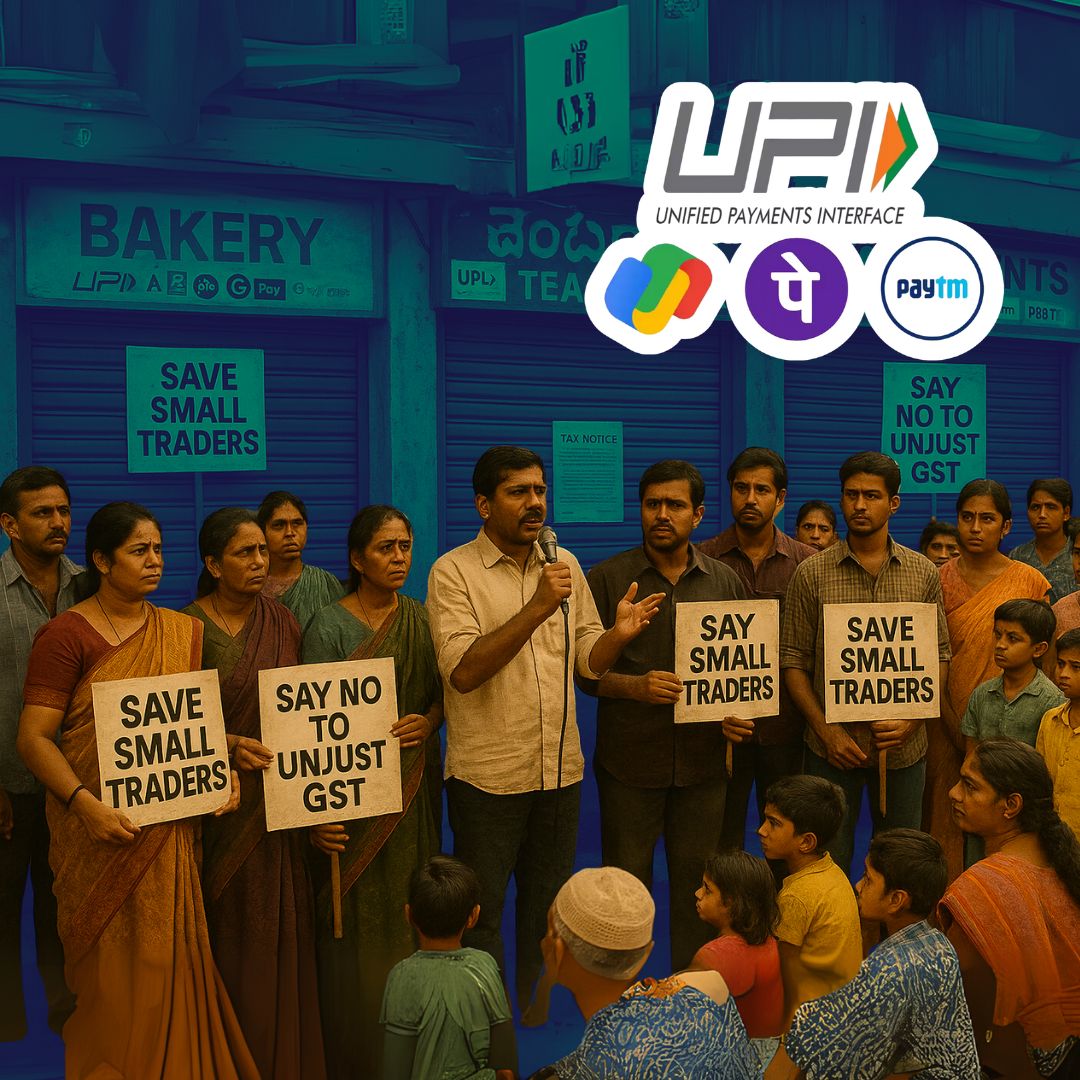Small traders across Karnataka—including those running condiments, bakeries, tea stalls, and cafes—are planning a statewide shutdown on July 25, 2025, protesting against GST demand notices issued by the state’s Commercial Tax Department.
The crackdown follows digital payment data showing UPI and bank transactions exceeding ₹40 lakh, the GST registration threshold. While the department insists notices are sent only to those legally liable, traders complain that the demands are excessive and threaten the survival of small businesses.
The phased protest involves suspending milk and tobacco sales before the full bandh, and has drawn support from various shops, street vendors, and trading associations.
Small Traders at Breaking Point: “Livelihoods Under Threat”
The GST notices have sent shockwaves through more than 65,000 small business owners in Karnataka. Many allege that the tax demands are vastly disproportionate: several shop owners report being asked for lakhs, sometimes crores of rupees, despite having total assets worth far less.
“We’ve been a neighbourhood bakery for decades, working on thin margins. The tax department now says we owe ₹39 lakh in GST, which would destroy us,” said Sudhakar Shetty, a shopkeeper from Bengaluru. Associations representing bakeries, tea shops, and petty traders are spearheading the protest in multiple phases—first by stopping milk and milk product sales (23–24 July), then halting gutka and cigarette sales, before closing shops altogether on July 25.
Families and community members are expected to gather at Freedom Park, with large-scale peaceful protests and rallies planned across the state.
Tax Crackdown Sparks Digital Payment Backlash and Political Outcry
Authorities say the crackdown follows an analysis of UPI and other digital receipts from FY 2021-22 to 2024-25, revealing unregistered businesses with annual receipts beyond ₹40 lakh—the threshold that mandates GST registration. Vipul Bansal, Commissioner of Commercial Taxes, stated, “We are only following the law. If traders fall under exempted categories or composition schemes, they can clarify with documents.”
However, many businesses say the department has not considered turnovers involving exempted goods or collective accounts for multiple shop branches. In a worrying trend, some shopkeepers have started refusing UPI and digital payments, pushing customers back to cash, which risks reversing the digital adoption India achieved after the pandemic.
Political leaders from both ruling and opposition parties have weighed in—some calling for dialogue and relief for genuine small businesses, while others demand strict enforcement to curb tax evasion.
Background: Nationwide Implications and the Road Ahead
This confrontation is rooted in India’s larger push for digital payments, which surged during and after the COVID-19 pandemic. Small traders embraced UPI and QR payments, believing them to be safe and transparent. However, the use of digital trails for retrospective tax scrutiny—often without accounting for cash-flow fluctuations or exempt goods—has left businesses feeling betrayed by a system they helped strengthen.
The Karnataka bandh could serve as a model for similar protests in other states, with small business federations across India watching closely. The state tax department has warned that if dues go unpaid, it may freeze bank accounts or begin recovery proceedings, further raising the stakes as the shutdown date nears.
The Logical Indian’s Perspective
Robust tax systems are the foundation of a fair and just society, but they must not come at the cost of destroying the small businesses that form India’s economic backbone. At The Logical Indian, we believe every policy should blend compliance with empathy, ensuring that honest traders are not pushed into ruin.
As Karnataka stands at this crossroads—balancing digital modernisation, tax compliance, and social justice—we call for open, transparent dialogue between the government and trade bodies. How do you think India can encourage responsible taxation while supporting small businesses and protecting the digital progress we’ve made?













